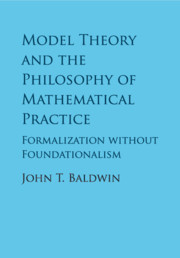Book contents
- Frontmatter
- Dedication
- Contents
- List of Figures
- Acknowledgments
- Introduction
- PART I REFINING THE NOTION OF CATEGORICITY
- PART II THE PARADIGM SHIFT
- PART III GEOMETRY
- PART IV METHODOLOGY
- 12 Formalization and Purity in Geometry
- 13 On the Nature of Definition: Model Theory
- 14 Formalism-Freeness (Mathematical Properties)
- 15 Summation
- References
- Index
14 - Formalism-Freeness (Mathematical Properties)
from PART IV - METHODOLOGY
Published online by Cambridge University Press: 19 January 2018
- Frontmatter
- Dedication
- Contents
- List of Figures
- Acknowledgments
- Introduction
- PART I REFINING THE NOTION OF CATEGORICITY
- PART II THE PARADIGM SHIFT
- PART III GEOMETRY
- PART IV METHODOLOGY
- 12 Formalization and Purity in Geometry
- 13 On the Nature of Definition: Model Theory
- 14 Formalism-Freeness (Mathematical Properties)
- 15 Summation
- References
- Index
Summary
We discussed ‘formalization’ at length in Chapter 1. What do we mean by ‘formalism-freeness’? Kennedy begins with
That mathematics is practiced in what one might call a formalism-free manner has always been the case – and remains the case. Of course, no one would have thought to put it this way prior to the emergence of the foundational formal systems in the late nineteenth and early twentieth centuries. [Kennedy 2013]
Kennedy goes on to explore what Gödel [Gödel 1946] calls the search for absolute notions of computability, provability, and definability. We try to distinguish such practice from the use of logical methods (either for metamathematical studies or as tools for proving mathematical results in the normal sense (in number theory or geometry or graph theory or …)). Formalism-freeness does not argue against formal methods per se. Here we point to a number of instances where model theorists have studied informal equivalents of fully formalized frameworks (Tarski) or found such frameworks inadequate for certain goals (Makkai–Reyes, Shelah, Hrushovski– Zilber). Our general theme differs from Kennedy's by focusing specifically on the development of formal theories for parts of mathematics.
Formalism-free is a matter of degree. It involves dropping some of the components of Definition 1.0.1. Clause 1 of Definition 1.0.1 is sacrosanct. We deal only with structures of a fixed vocabulary.
To clarify the situation, we distinguish between ‘formalism-free’ and ‘formalism-independent’. We call a definition formalism-free if it is given semantically without any formal distinction between syntax and a semantics. For example ‘a group is a set and a binary function satisfying …’ We call an investigation formalism-free if it is a semantic study. Thus there are two aspects: definition and investigation.
Here are three illustrative examples of formalism-free definition; we study some such investigations in a few pages. We say a notion, such as ‘computability’, is formalism-independent (formalism-free in Kennedy's terminology) because of the known equivalence among the Turing,Markov, ƛ-calculus, and Gödel characterizations. Only the Gödel characterization as _01 -definable functions in number theory is completely formal in the sense defined here; Turing machines are formalism-free.
Secondly, as Kennedy has pointed out, if L is constructed by adding relatively definable sets then the usual L is obtained by several different logics, e.g. by iterating either first order definitions or weak second order logic definitions.
- Type
- Chapter
- Information
- Model Theory and the Philosophy of Mathematical PracticeFormalization without Foundationalism, pp. 300 - 311Publisher: Cambridge University PressPrint publication year: 2018



